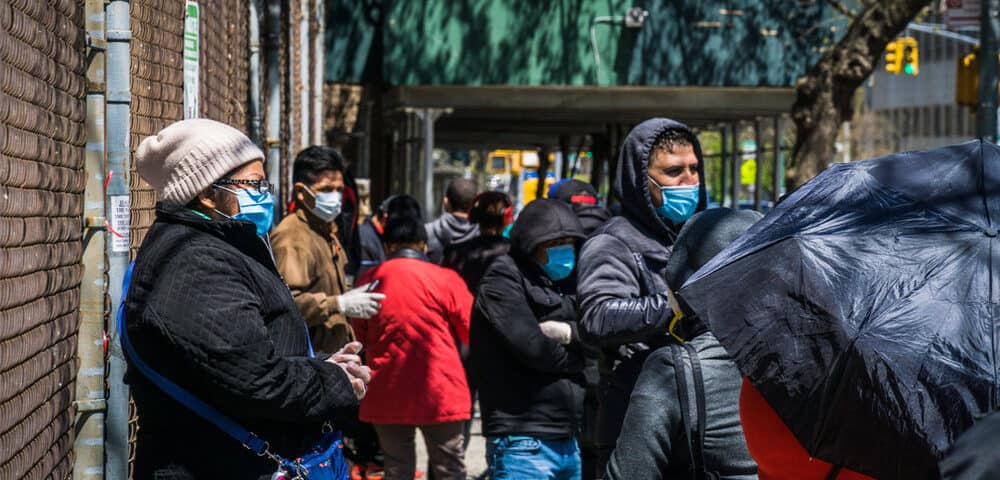
Pandemic Philanthropy: Moving From Relief to Power
May 7, 2020
by Dimple Abichandani
Published in Inside Philanthropy
We wake up each day to news of loss on a scale that is hard to comprehend, and we feel in our bones that it did not have to be this way. Over 70,000 Americans have died in the last two months. Over 30 million people in the U.S. have lost their jobs and are grappling with the ripple effects of sudden unemployment. (These numbers will most definitely have gone up by the time you read this.)
It’s only week eight of the COVID-19 pandemic, a global crisis that may be with us for years.
But here’s the thing.
There is nothing “natural” about this disaster, at least not in the way it’s unfolded in the United States. Yes, a virus is the spark of this disaster. But the economic and social crisis in which we find ourselves is a result of a decades-long ideological assault on the role of government and deeply entrenched racial, gender and economic inequality in our society.
The philanthropic sector is not known for speed or adaptability, and yet it has been heartening to see foundations make rapid adjustments to entrenched practices, increase their 2020 giving, and create rapid-response funds. Certainly, these approaches meet real and aching needs.
Yet, a philanthropic playbook that centers relief, while aiding some immediate needs, is not designed to address the longer-term systemic reform that is needed. The heart of this crisis is all about power: who is heard, whose interests are protected, who is afforded agency over their lives and livelihoods. What is really called for in this time is a long-term, large-scale philanthropic response to shift power to people and support organizations in building a just and caring society.
Beyond the Virus: A Crisis of Democracy, Economy and Inequality
This crisis is not simply about a few bad choices by a few bad leaders. Rather, we are seeing what life is like when the right is successful in enacting a long-term agenda to dismantle government and create an unregulated environment to favor large corporations. While the coronavirus is “novel” in the medical sense, the crisis of governance we are experiencing is decades in the making.
The current economic crisis is also not simply a result of the virus. It has been set into motion as the result of a sustained divestment from government and a set of narratives imagining a government with little obligation to its people. All over the world, countries less rich than the U.S., from South Korea to the Netherlands and the U.K., are keeping workers connected to their jobs and keeping businesses intact by covering payroll during the coronavirus epidemic. But in the U.S., the richest country in the world, our federal government hit pause on the economy without widespread employment protections, forcing businesses to release their workers to the precarity of unemployment. Our government has created a false and dangerous choice between public health and the economy. As states rush to reopen, we can expect this choice to be a fatal one for those who are most at risk.
We know the virus is disproportionately impacting the most vulnerable, including black communities, immigrant communities, the disabled, people in prison, and workers who are paid low wages, and amplifying all the inequities that existed before the virus. Our “essential workers”—the healthcare workers, grocery workers and delivery workers who are putting their own health at risk each day to do the work that supports the rest of us to stay home—are the same workers that are often denied access to healthcare, paid time off and sick leave. These workers are disproportionately people of color and women. The virus did not cause the inequality; it existed before and is deepening in this moment. But the virus is shining a light on disparities and creating urgency for change.
How do we address these root causes in our philanthropic response?
1. Center power, not relief, in our philanthropic response.
This moment calls for a long-term, large-scale philanthropic response to shift who has power in our democracy and our economy. Let’s support those who are most marginalized in our current systems to build their voice and leadership to shape responses to this moment as well as the future. Let’s invest in community organizing, movement building, advocacy and other transformational strategies that can change who has power in our country. And let’s strive for every philanthropic response to incorporate a race and gender lens, because every aspect of this crisis has had, and will continue to have, disproportionate impact on people of color and women.
2. Let’s use resources and our platforms to call for good and accountable government.
We see today what has always been true—that good government that is transparent, accountable and caring for all its people is not a “nice to have,” but is actually a matter of life and death. Many funders in this moment are resourcing gaps in the safety net, whether it’s cash assistance for unemployed workers, food banks or other critical needs. As we make these investments, we must also use our platforms and our funding to call out the need for a government that works for all its people and provides a strong safety net. We must remember that the resources we have at our disposal in private philanthropy are dwarfed by the scale of what the government can leverage through tax policy. Philanthropy cannot and should not be seen as a substitute for a functional government. Let’s fund the civic engagement that leads to accountable and responsive governance at our local, state and federal levels.
3. Fund this once-in-a-generation opportunity to reimagine/rebuild our social contract.
Ai-jen Poo of the National Domestic Workers Alliance describes this moment as a once-in-several-generations opportunity to transform and update how we care for one another in this country. In fact, in just our first two months with the virus, we have seen policy leaders propose or enact a range of programs and policies that were previously regarded as “impossible,” including the release of people convicted of non-violent crimes,the passage of federal sick leave, and serious proposals for universal basic income. The social contract is being revised in real time. As we fund in this moment, let’s see it not only as a moment of need, but rather a historic moment of opportunity for needed transformation. Let’s invest in organizations that center workers in the rebuilding of our economy and will create a society in which we center those at the margins.
4. Make a long-term commitment, because we are not going to fix this in 2020.
Relief funding is often short-term: Commitments are made for a few months, or maybe a year. But the work of shifting power, shifting narratives and rebuilding a more just and caring society and economy will take time. As we develop new budgets to meet this moment, let’s think well beyond 2020. Now is the time for us to increase grant sizes and grant terms and give grantees the flexibility (general operating support) that is essential in times of crisis. With endowment values declining, many grantees are bracing themselves for drops in funding. We can give grantees important stability and flexibility with three- to five-year funding commitments. We can set them up to realize the opportunity in this moment with increased funding.
We are all wondering what life will look like on the other side of this crisis, but the truth is that it is our collective actions in this moment that will determine what that future will be. We have an opportunity right now to shape our new reality. If we are intentional and generous with our investments, if we correctly identify the challenges and work boldly to resolve them, we can fuel a transformation toward the more just and caring future we’ve been longing for.
Link to article on Inside Philanthropy:
https://www.insidephilanthropy.com/home/2020/5/7/pandemic-philanthropy-moving-from-relief-to-power?utm_source=Funding+News+%26+Tips&utm_campaign=8a03cefd48-RSS_EMAIL_CAMPAIGN&utm_medium=email&utm_term=0_c776dbf0df-8a03cefd48-95085457
